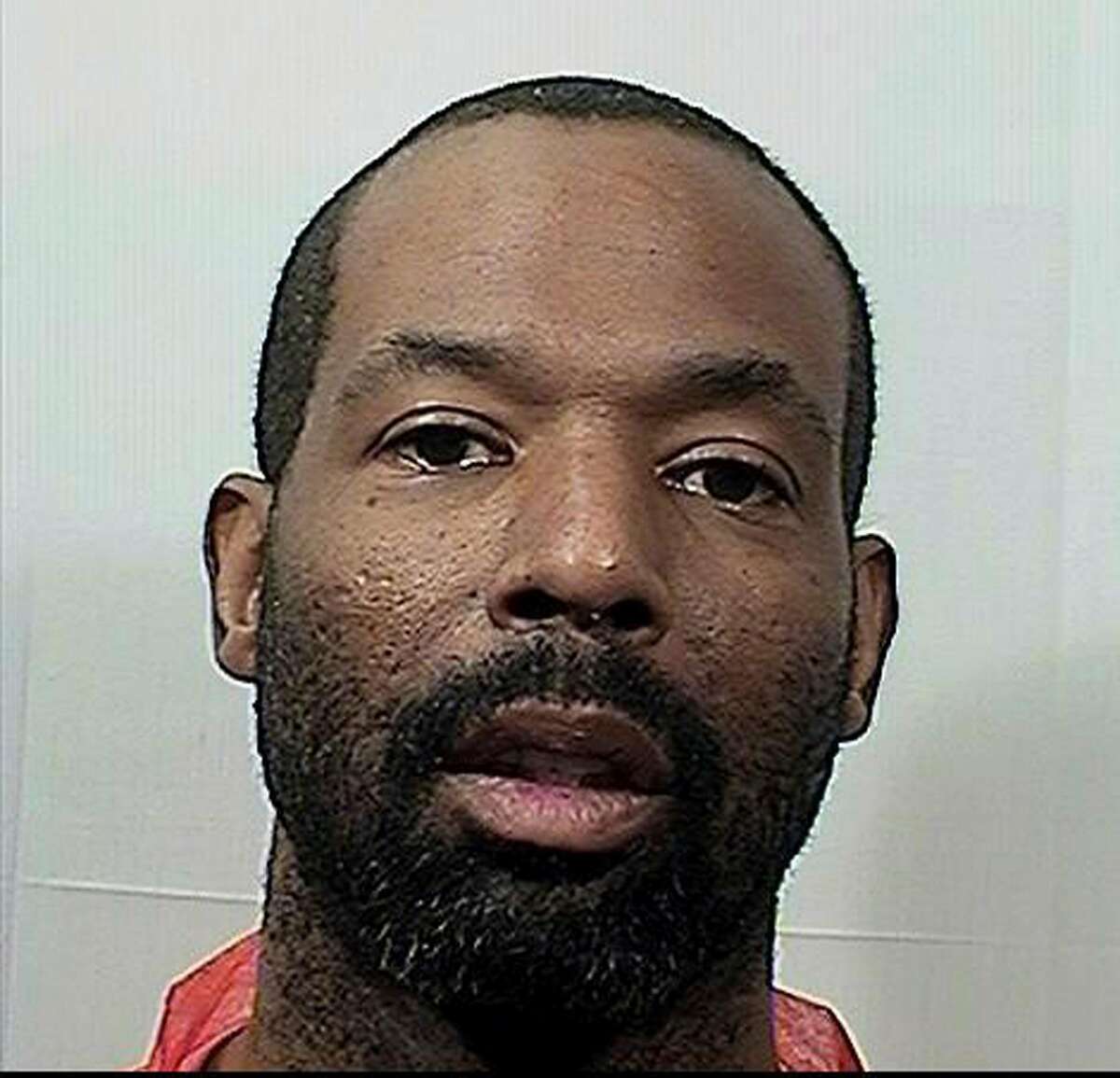
On Monday morning, a California man named Napoleon Brown woke up in a San Francisco jail cell after more than two decades in state prison. He was in the city to seek a reduced sentence for his role in an infamous robbery-carjacking in 2000 that led to the death of his then-girlfriend on the Golden Gate Bridge. He’s already been in prison more than 22 years, and is set to stay another 22 more under a plea deal he reached with prosecutors.
On that same Monday morning, his sister, London Breed, woke up in her home in San Francisco’s Haight neighbourhood, starting another busy day as mayor of San Francisco.
Both siblings grew up in poverty not far from San Francisco City Hall in the Plaza East housing projects. Together, they’ve spent the last two decades urging the court system to get Brown out of prison and give him a second chance at the opportunities his sister was able to find, despite the odds. They argue that relevant California law sentencing has changed, and Brown should go free.
“After 22 years, he has served enough time,” Brown’s lawyer Marc J Zilversmit told The Independent.
It’s a long, strange case that has presented ethical challenges for Mayor Breed, and raised questions about how far California is willing to go in its decades-long attempts to reduce its massive prison population.
On 19 June, 2000, Brown, then 24, and an associate robbed a Johnny Rockets diner around midnight in the Marina neighbourhood, according to prosecutors. The pair forced workers, who were preparing to close up shop, to lie facedown on the ground, while the thieves stole $7,000 from the restaurant’s safe, according to police.
A police officer named Gary Watts then followed the men as they got into a white Ford driven by Lenties White, Brown’s girlfriend. The officer didn’t turn on his siren, and tailed the car as it crossed the Golden Gate Bridge.

Suddenly, the getaway car stopped in a coned off buffer lane, and White either fell or was pushed from the driver’s seat onto the pavement. One of the men in the car then walked around to take the wheel. At this, the officer said in court he ordered the man to get on the ground and the woman to get off the road.
But it was too late. A drunk driver in the opposing lane struck White. Police said her last words implicated “SB,” thought to be Brown’s nickname “Sonny Boy,” in the crime, and gave officers Brown’s address.
Mayor Breed, who was 25 at the time, told police she had arrived at the home of the grandmother, who raised both siblings, around midnight the morning of the robbery. She said she found her brother asleep on the couch. She added that she wasn’t sure if he was still there when she went off to work later that morning. The family has said Brown didn’t go by SB, either.
The mayor’s office did not respond to a request for comment from The Independent.
Brown was convicted of murder, robbery, and car theft, with a gun enhancement in 2005, but appealed his conviction, arguing his lawyers were incompetent.
In 2006, he was granted a new trial on the murder charge, a decision later affirmed by an appeals court in 2009. By 2012, he worked out a deal with prosecutors on the pending murder charge to plead no contest to involuntary manslaughter and serve his sentence concurrently with his previous offences.
The manslaughter charge was made under the so-called “felony-murder rule.”
It’s a concept that dates back to English common law, which holds that one can be guilty of murder or manslaughter for a death if it occured during the commission of another serious crime, even if the death was an accident.
Together, the plea deal and the previous charges meant Brown would have to serve a total of 42 years, and an extra two years were tacked on when Brown was found with heroin in prison. The case didn’t end there though.
In 2014, the San Francisco Chronicle reported that Ms Breed, then on the city Board of Supervisors, called the San Francisco District Attorney George Gascón for help reviewing her brother’s sentence, an offer he ultimately declined.
Mr Gascón declined to comment for this article.
Ms Breed told the paper she had “no recollection” of such a call, and denied using her position to get special treatment for her brother.
“I am absolutely certain that through the long course of my brother’s legal case, I have never asked for any special treatment from the district attorney’s office or anyone else, nor have I received any,” she told the Chronicle. “Every time I have weighed in on my brother’s case, it has been under the guidance of his defense attorney, at appropriate times and by appropriate means.”
Four years later, in 2018, Ms Breed used her office’s stationary to write a letter along with family members asking then-Governor Jerry Brown for her brother’s early release, conduct which was included in a $23,000 set of fines in 2021 from the San Francisco Ethics Commission, accusing the mayor of “significant” ethics violations.
In the message, Ms Breed and her family wrote, “Napoleon struggled early on with a sense of hopelessness. And like many others, he developed a bad drug problem at an early age. His drug addiction led to a young life of crime.”
“Although I don’t believe the 44-year sentence was fair, I make no excuses for him,” the letter continued. “His decisions, his actions, led him to the place he finds himself now. Still, I ask that you consider mercy, and rehabilitation.”
While these attempts fell flat, the case changed in 2019, when a law called SB1437 passed, restricting the use of the felony murder statue as part of the state’s wider attempts to reduce its prison population, still among the largest in the country. That, combined with a 2021 law allowing those convicted of manslaughter to seek re-sentencing, gave Brown another shot after 22 years in prison.
Brown’s lawyers now argue that even if Brown did push White into the coned off lane on the bridge, the chaos of the scene, with officers yelling a mix of commands to lie down and stand up, suggest what happened wasn’t a clean-cut murder or manslaughter.

“Given the unusual circumstances that led to Lenties White’s death being hit by a drunk driver while the police ordered her to lie down in the safety lane of the bridge, this case no longer meets the definition of murder, so he is entitled to resentencing,” Mr Brown’s lawyers said.
“Brown’s case is one of hundreds of felony murder convictions that no longer meets the definition of murder under the amended statute,” they added. “In this way, it is not unique at all. Every week, murder and manslaughter convictions are being set aside by courts across California.”
In court on Monday, Brown was consigned to wait even longer for a chance at freedom. Lawyers for the city asked for a continuance, delaying a decision on his sentencing request, and a judge asked prosecutors to explain in greater detail how they would handle the case, given its thorny ethical complications.
The delay likely won’t stop Mayor Breed or her family from campaigning for Brown’s release.
The mayor has spoken often of her brother’s case, talking about it as part of the larger set of challenges her family faced growing up in poverty in San Francisco’s Western Addition neighbourhood. Her election was seen as a triumph in a city that struggles with deep racial and economic inequality.
Breed and Brown were largely raised by their grandmother, and experienced police harassment, neighbourhood violence, and the overdose death of their sister in 2006. Nonetheless, Ms Breed managed to obtain a graduate education, rise through city politics, and become San Francisco’s first Black, female mayor in 2018.
“I know the possibilities of what can happen when things go great in the city and what it can mean for someone’s life,” the mayor told Politico in 2022. “It’s the difference between me going to college and becoming mayor and giving back to the community in the way that I have and, sadly, my brother, who is incarcerated.”
Sanda McNeil, the mother of Lenties White says she’s upset by London Breed’s continued efforts to free her daughter’s killer.
“I don’t think it would be justice,” she told NBC Bay Area in 2018. “She’s the mayor, so she’s got a little power, so she thinks she can get her brother out.’’
Even after Monday’s hearing, it’s still unclear where exactly the San Francisco’s DA’s office plans to take Brown’s resentencing bid. A string of DA’s including Mr Gascón and his successor, Suzy Loftus, both declined to get involved in the case.
The resentencing bid, because of its ties to city hall and questions of violent crime more broadly, has become embroiled in local politics.
It passed to the new DA, Brooke Jenkins, who was recently appointed by Mayor Breed to replace justice reform-minded prosecutor Chesa Boudin after a contentious but low turnout recall effort. Some residents, fed up with violent crime, were backed by millions in conservative dollars, and revolted at the ballot box against Mr Boudin’s tactics aimed at reducing mass incarceration.
DA Jenkins asked the California Attorney General in July to take over the case, which the state rejected, and has said she’s trying to see if other local agencies can move in instead "to avoid any appearance whatsoever of a conflict."
"I am exploring whether other local agencies may be an option. Regardless, these cases will be handled according to the law and with integrity," she told CBS News.
The DA’s office did not respond to a request for comment.
Regardless of what happens next, Brown’s team says he has served plenty of time deserves another chance. Prison has at times broken his spirit.
“To be sure, Brown has struggled with addiction as he lost hope of ever being released,” Mr Zilversmit said. “But he has been sober since early this year when his case was remanded back to court for this resentencing motion, and he regained hope of being released.”
In the criminal justice system in California, however, and in the contentious city politics of San Francisco, nothing is guaranteed.
This article was amended on 16 August 2022. It previously stated that Napoleon Brown pleaded guilty to robbery and car theft as part of a plea deal in 2012. However, Brown was convicted of robbery and car theft in 2005, and his 2012 plea deal only concerned an involuntary manslaughter charge.







